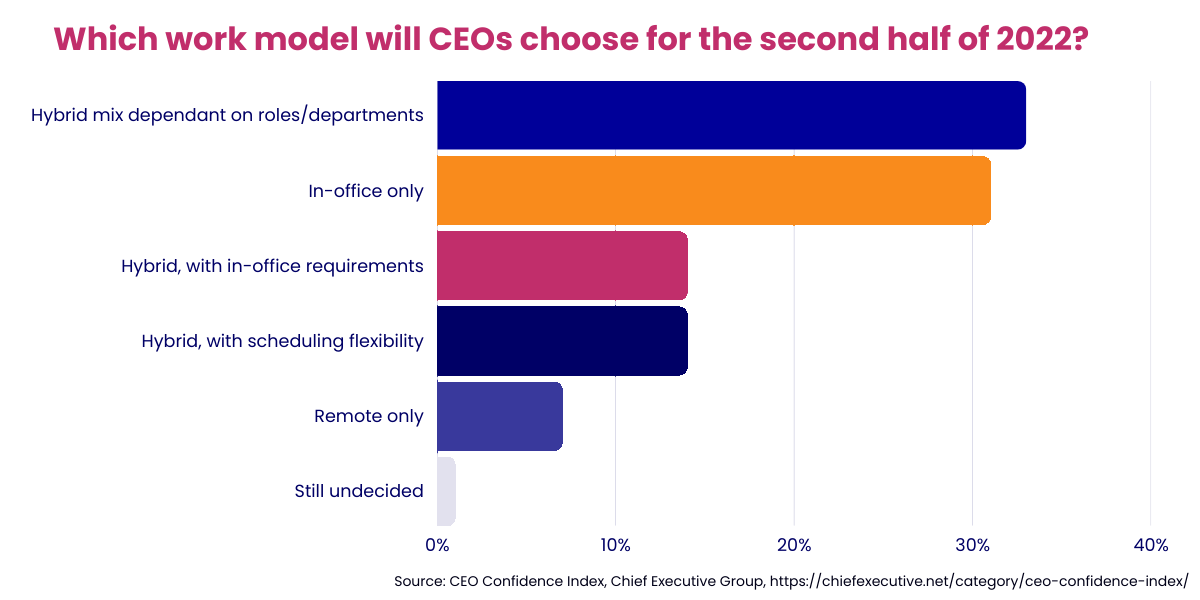Hybrid work models are the clear winner for 2022
Work from home? Back to the office? Somewhere in between? At this point, we know there's no one-size-fits all solution to the modern digital workplace.
Recent surveys paint a clear picture of where we are headed: hybrid work is here to stay...for now.
Business leaders are optimistic about hybrid work
According to the 2022 Future of Work report by Foundry, nearly all organizations (94%) shifted to some sort of hybrid structure due to the pandemic—meaning a flexible work model that melds remote and in-office workers.
Despite initial uncertainties around how hybrid or remote work would impact worker productivity, many organizations say the hybrid workplace model was a successful one. Now they believe remote and hybrid work will likely remain a permanent solution.
In a CEO Confidence Index survey from Chief Executive, research showed two-thirds of CEOs agree to use some kind of hybrid work model through the rest of 2022.
What will that approach look like?

About a quarter of those CEOs said they will require a certain amount of in-office time—say 3 days per week, or on specific "collaboration days."
Some will allow more scheduling flexibility, also known as "employee choice" or "at-will" hybrid models. With that approach, the office and shared spaces are open to all, but workers get to choose when (or if) they use them.
For many organizations, a unilateral "return to office" policy does not make sense. (And as some firms learned, that kind of sweeping decision can backfire and increase employee turnover.).png?width=275&name=Untitled%20design%20(6).png)
Some jobs can only be done on-site, while entire departments can easily work from anywhere...and aren't eager to be forced back to a commute. In that case, leaders are smart to choose a work model that accommodates both the needs of the employee and the business.
This may be why 33% say they're embracing hybrid, but with policies based on the needs of specific roles or departments, according to the Chief Executive survey.
Fortunately, this tracks with recent surveys of what employees want: globally, people say they’d prefer to work from home about 2-3 days each week once the pandemic is more contained.
Regardless of which strategy they chose, across the board execs say they'll remain flexible and adapt their workplace policies as conditions (inevitably) evolve—a wise choice.
Considerations for a successful hybrid workplace
What does this tell us? Above all, the future of work is flexible. Companies that understand the value of hybrid will gain the competitive edge.
There are pain points, though. From a technology perspective, remote and hybrid work raises unique concerns—particularly around collaboration, security, and employee experience.
The Foundry report revealed that 69% of IT leaders agree the shift is impacting how they plan for office space, tech investments, and overall staffing, with "very few preparing for an office-only environment."
From HR to IT, business leaders are now concerned about creating an equitable experience for hybrid teams. Decision-makers need to plan around what people need when they meet at the office, work from home, or service customers in the field—accounting for everything from employee technology to company culture and benefits.
No matter which environment you choose, you have to build the infrastructure to support your employees anywhere and anytime. We can help.
At Compucom, we deliver end-to-end IT managed services that keep you at the forefront of the digital workplace. Explore our solutions and book a meeting to learn more.





